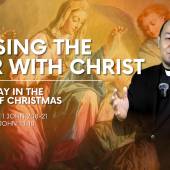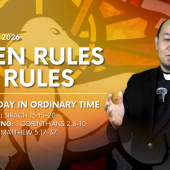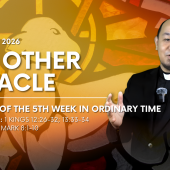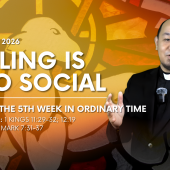Internal Disposition is more important than External Rituals!

August 1, 2025 Friday of the Seventeenth Week in Ordinary Time
Memorial of Saint Alphonsus Liguori, Bishop and Doctor of the Church
Daily Readings: Leviticus 23:1, 4-11, 15-16, 27, 34b-37; Matthew 13:54-58
Festivals are sacred occasions where people gather to worship, offer sacrifices, and celebrate their faith. In the Israelite tradition, as described in Leviticus, these festivals deepened their covenant with God. Passover and the Feast of Unleavened Bread commemorated the Israelites’ miraculous deliverance from Egypt. Pentecost, celebrated 50 days later, marked the grain harvest and the offering of the first fruits. The Day of Atonement was a solemn time for repentance and reconciliation with God. The Feast of Tabernacles recalled the Israelites’ journey through the wilderness, living in tents under God’s protection.
These celebrations were not merely ceremonial; they were meant to be heartfelt expressions of faith, gratitude, and communal identity. But over time, there arose the danger of empty ritualism—when form outweighs substance and faith becomes mere tradition.
In the Gospel, Jesus visits His hometown of Nazareth and teaches in the synagogue. The people are astonished by His wisdom and power, yet their amazement turns into skepticism. Instead of recognizing the divine in Him, they reduce Him to His earthly origins: “Is He not the carpenter’s son?” Their knowledge of His family becomes a stumbling block to faith. Despite His teachings and miracles, they dismiss Him because of social prejudice and familiarity. Their lack of faith limits what Jesus can do among them. The Gospel subtly underscores a vital truth: miracles are not magical displays; they are acts of divine grace that require a willing heart. Faith unlocks the power of God’s word.
Call to Action: Am I merely going through the motions of religion, or is my heart truly engaged? Jesus works miracles where faith abounds. Today, I ask myself: How deep and authentic is my faith?
Radio Veritas Asia (RVA), a media platform of the Catholic Church, aims to share Christ. RVA started in 1969 as a continental Catholic radio station to serve Asian countries in their respective local language, thus earning the tag “the Voice of Asian Christianity.” Responding to the emerging context, RVA embraced media platforms to connect with the global Asian audience via its 21 language websites and various social media platforms.














